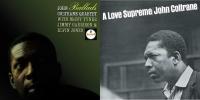A Coltrane Review "Two-Fer"— Verve's New A Love Supreme and Ballads
On Ballads Coltrane abandons the "sheets of sound" approach and with his classic quartet plays it 100% straight. Most of this album was recorded in single takes with everyone arriving at Van Gelder's studio with store-bought sheet music November 13th, 1962 so I suppose this review should have been published tomorrow on the 58th anniversary but the album was released in 1963 so why wait?
This is an album that will never go out of style and never be unwelcome on any jazz lover's turntable. Gene Lees annotation is just weird because it completely ignores the contributions of McCoy Tyner, Jimmy Garrison and Elvin Jones. When you listen you'll not be able to.
I compared this Ryan K. Smith cut with an original pressing (so happy to have) and with the out of print double 45rpm ORG Music version cut by Bernie Grundman aboutt a decade ago. It would take work to produce a bad version of this beauty. The original has that "new tape" vibrancy and Rudy laid off of the compression and midbass muck. Bernie's 45rpm cut has a pleasing warmth without sacrificing transient articulation and Ryan's cut has his characteristic clarity and transparency all set against QRP's usual jet black backgrounds (some knucklehead on the "What's Best Forum" took me to task for using the word "black" in another review, claiming it was somehow racist—I"m not kidding). Ryan's new cut is a 100% top to bottom success and is easy to recommend.
Rudy's Bad Day—A Love Supreme
Two years later, on December 9th, 1964 the quartet returned to Englewood Cliffs (along with Archie Shepp and Art Davis who performed on one unreleased track) to record Coltrane's PTL album. He feels the spirit in music and sums it up perfectly in three words "ELATION—ELEGANCE—EXALTATION" capitalized in the "A Love Supreme" poem on the inner gatefold. What sounded absolutely ferocious in 1965 sounds more measured and controlled though no less intense. Coltrane thanks in the notes the other musicians who play on this, which is both gracious and called for. You could argue that on side one McCoy Tyner's keyboard work almost steals the show. You needn't be religious or even spiritual to appreciate Coltrane's intense devotion as he draws endless variations around the simple incantation.
Anyone who tells you the original pressing bests this new one simply has not heard either! Rudy must have been distracted when he cut the original because he failed to notice a horrendous hum that begins before the music on side one and continues throughout. The original also suffers from his trademarked lower midbass boost and overall compression that adds unwelcomed thickness to Tyner's piano and to the "A Love Supreme" vocal chant. The original is just not very good at all. Quite the opposite for Ryan Smith's cut. Tyner's piano in particular is spectacularly well-served sitting clearly and convincingly in three-dimensions between the speakers. You could say Coltrane's sax is slightly thinner than you might want but that would be system-dependent and as far as I'm concerned the cut is another out of the park home run set against black backgrounds.
Everything about these two Coltrane releases from the Stoughton press laminated tip-on jackets to the outstanding mastering and pressing exudes the highest quality experience offered by all- analog records. The bad news is that the initial run of these titles (probably greater than how many of the originals were pressed and sold) is just about sold out. The good news is that these titles have no set "out of print" date, but as I've said for years now "get 'em while you can". And at $34.99 each, you'd be crazy not to.




